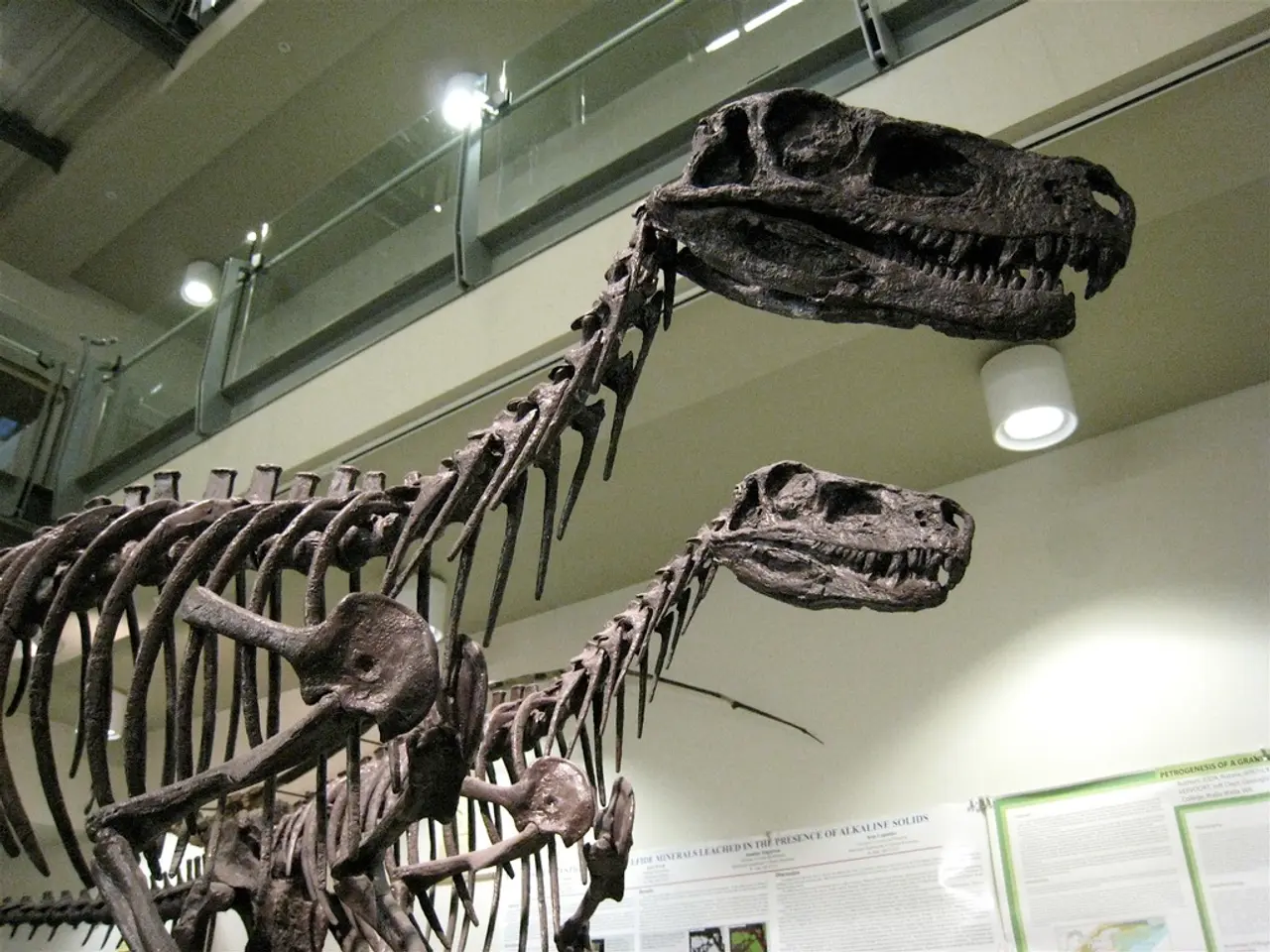Illicit Dinosaur Bone Deals Uncovered - Behind-the-scenes dealings over fossilized dinosaur remains (starred)
**Investigative Report: The Dark Side of the Fossil Trade – Unveiling the History and Common Issues in Dinosaur Fossil Markets**
The commercial trade of dinosaur fossils has been a subject of intrigue and controversy since its inception in the 19th century. With major discoveries fueling public fascination and scientific curiosity, the market for dinosaur fossils has evolved significantly, transforming from a primarily scientific pursuit to a lucrative business for private collectors, museums, and investors.
However, this burgeoning industry is not without its challenges. In recent years, concerns have been raised about the dark side of the fossil trade, particularly in the dinosaur fossil market.
1. **Illegality and Smuggling** Many fossils, especially those from rich deposits in countries like Mongolia, China, and parts of South America, are removed illegally, often without permits. This illegal excavation damages valuable paleontological contexts, which are crucial for scientific study.
2. **Loss of Scientific Data** Fossils sold on the private market often end up in collections inaccessible to researchers. When specimens are privately owned, details about their provenance, stratigraphy, and precise find location can be lost, severely limiting scientific understanding.
3. **Forgery and Misrepresentation** The demand and high prices for dinosaur fossils have incentivized forgery. Composite skeletons made from genuine bones mixed with artificial parts or bones from multiple species are sold as authentic, undermining trust in the market and disrupting genuine research.
4. **Ethical Concerns** The commercialization of ancient remains poses ethical questions about cultural heritage and scientific stewardship. Many paleontologists argue that fossils belong to humanity and should be preserved in public institutions rather than sold for profit.
5. **Environmental and Heritage Destruction** Fossil extraction without scientific oversight can lead to environmental degradation and the permanent loss of heritage sites, especially in vulnerable ecosystems.
---
### Current Market Trends
The fossil market is currently booming, with high-value dinosaur fossils fetching millions of dollars at auctions. Recently, a Stegosaurus was sold for nearly 45 million US dollars, while a Ceratosaurus is currently being auctioned by Sotheby's in New York for an estimated four to six million US dollars. The Torosaurus skull, the showstopper of the upcoming Hampel auction in Munich, could potentially join this exclusive club.
---
### The Hampel Auction and the Torosaurus Skull
The Hampel auction, scheduled to take place on a Thursday in Munich's northern industrial belt, is creating a stir in the fossil world. The auction house is set to feature a well-preserved Torosaurus skull, a find so rare that the number of well-preserved Torosaurus skeletons can be counted on one hand. Dimitri, an employee at the warehouse where the auction is taking place, is greeting potential buyers, including an intermediary registered for the event. If confirmed and with no hidden flaws, this Torosaurus skull could potentially be a bargain for multimillionaires.
---
### The Dark Side of the Fossil Trade
Last year, stern investigated the dark side of the fossil trade in an investigative report. The report highlighted the issues discussed above, as well as specific cases and investigations into illegal excavations, forgery, and the loss of scientific data.
---
### Conclusion
The dinosaur fossil trade is a complex landscape, balancing scientific integrity, legal frameworks, and commercial interests. While fossils ignite fascination and can sometimes be preserved enthusiastically by private collectors, the dark side—illegal excavation, loss of scientific context, and forgery—continues to threaten both the advancement of paleontology and preservation of ancient heritage.
---
If you want, I can help locate references or news articles specifically detailing cases or investigations into these issues. Let me know if you want me to search further.
- The Commission has been asked to submit a proposal for a directive on the protection of the environment, focusing on the issues of illegal excavation, loss of scientific data, and forgery in the dinosaur fossil market revealed by the investigative report titled "The Dark Side of the Fossil Trade".
- In the realm of science, researchers and paleontologists advocate for stricter regulations in the dinosaur fossil market, citing the importance of protecting precious paleontological contexts and safeguarding scientific data from loss due to market demands and illegal activities.
- In the realm of finance, the booming dinosaur fossil market, with high-value fossils selling for millions of dollars, underscores the need for oversight and transparency to prevent market manipulation and ensure that fossil sales are ethically sound and legally justified.
- In the realm of education and self-development, it is crucial to foster a deeper understanding of the importance of fossils in our collective history and appreciate them in a way that supports scientific knowledge and encourages responsible stewardship rather than fostering a culture of commodification and profiteering.
- In the realm of space and astronomy, researchers and people with a general interest in science may look up to their idols, who cultivate curiosity about the universe, but also advocate for the importance of preserving our own planet's rich paleontological heritage from the dark side of the fossil trade.




